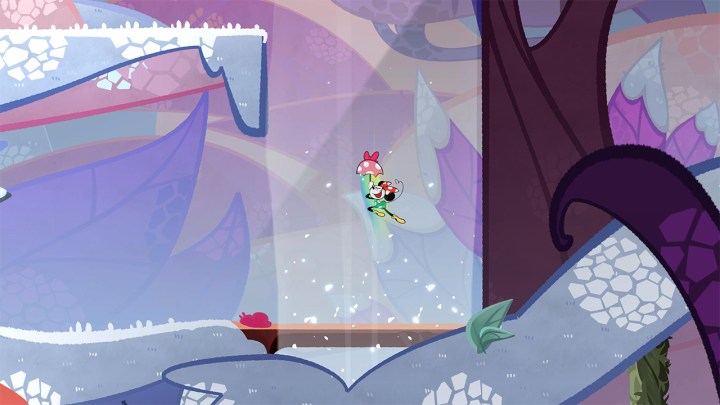
Those of us who have played video games from a very young age probably have some weird licensed games that we only owned because someone knew we liked a particular franchise or character. And if you’re like me, many of those were Disney games. These varied wildly in quality, but I look back fondly on decent licensed games like The Incredibles and Finding Nemo as some of my most formative gaming experiences. After going hands-on with Disney Illusion Island, I’m confident it’ll be that kind of game for many kids in the 2020s.
Thankfully, it’s shaping up to be great, not just decent. Ahead of its launch on Nintendo Switch next month, I had the chance to try Disney Illusion Island at Summer Game Fest Play Days this year. I was struck by how simple and satisfying it was to play, how playing cooperatively adds some helpful features, and how this is actually an ambitious, combat-free Metroidvania (or Mickeyvania, as its developers want to call it) that’s doing its best to draw players of all ages in.
More ambitious than expected
Disney Illusion Island is a 2D platformer utilizing the visual style of the recent The Wonderful World of Mickey Mouse shorts. It’s a straightforward pitch: pick Mickey, Minnie, Donald, or Goofy and jump around some Disneyfied locales. In all regions, the voice actors for the characters reprise their roles from the shorts. Developer Dlala Studios was an excellent choice for this game as it’s already established itself as a go-to studio for stylish 2D games with 2020’s Battletoads.
This game could have gotten away with being a pretty, but extremely simple level-based platformer only meant to be played by young children for a couple of hours. Dlala went a step further, though, and has made a full-blown Metroidvania platformer that has some unique gameplay ideas and will appeal to all ages.

The game’s first intriguing design choice pops up as soon as you have to pick a character. Dlala made the decision not to give characters distinct abilities. Mickey, Minnie, Goofy, and Donald are all animated uniquely and can use different items for certain moves, but these differences are purely visual. Dlala told Digital Trends this decision was made because they realize each one of the four is someone’s favorite character, and they didn’t want to punish someone for picking their favorite by locking away abilities or making them easier or harder to play as.
Thankfully, the core platforming is more than enough fun to make up for it. During my demo, I could pull off a satisfying double jump and wall jump to get to new places, but Dlala teased that more abilities like gliding, swinging on grapple points, and swimming will come later in the adventure. When these are unlocked, the game’s map will mark where these moves can be used to access new areas, making it an approachable Metroidvania.

What also makes Dinsey Illusion Island stand out from other games of its ilk is that there’s no combat. Any “enemies” I encountered during my demo, including a cactus ball, were to be avoided, not attacked. This approach makes Disney Illusion Island not only very kid-friendly, but also truly unique within the Metroidvania space. Any substantial obstacles players come across are purely platforming-based, including bosses. At the end of my demo, I had a boss fight that challenged me to hop on various buttons during the short window of time where they were exposed.
Like I would learn how to optimally account for and counter a boss’s attack in a traditional fight, I learned the button pattern and tried to find the best way to press them all very quickly without taking damage. The battle was satisfying, but went by quickly, although it went so fast because I was playing with a developer. Unlike Sonic Superstars, I had a chance to try this game in multiplayer, and it’s a great addition that even brings some unique gameplay mechanics with it.

You can hold a rope to help another player to a platform they might be struggling to get to or hug them to gain additional health. Playing Disney Illusion Island with someone else brought back memories of playing titles like Rayman Origins or Super Mario 3D World with my brother. I’m sure Disney Illusion Island will create some similar memories for young siblings playing it together later this year. This will be a good game for parents to play with their kids too.
While all characters play the same, individual players can make their experience a bit tougher or easier by adjusting how much health they have before jumping into a game. That kind of difficulty customization, along with its cooperative, combat-free approach to the Metroidvania formula, makes it a worthwhile title for more hardcore gamers to pay attention to.
Disney Illusion Island looks unassuming on the surface, and many kids will likely get gifted it just because one of their relatives knows they like Mickey Mouse. My Summer Game Fest Play Days demo indicates that getting this game in that way won’t be a bad thing, though.
Disney Illusion Island will be released for Nintendo Switch on July 28.



